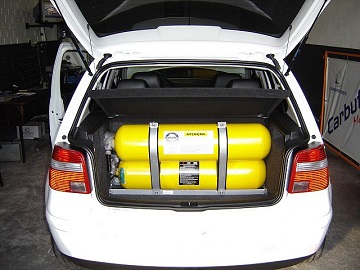The nascent Compressed Natural Gas (CNG) sector in Nigeria, intended as a cleaner and more affordable alternative to traditional fuels, is grappling with significant teething problems, most notably, a severe lack of infrastructure leading to long queues and frustrating delays for motorists. This burgeoning crisis mirrors previous episodes of fuel scarcity, raising concerns about the government’s preparedness and the effectiveness of its implementation strategy. Truck drivers are reportedly spending days queuing at CNG stations, painting a stark picture of the challenges faced by those adopting the alternative fuel. The situation is particularly dire in high-traffic areas like Abuja and along the Ibadan Expressway, where long wait times have become the norm, turning what was envisioned as a solution into a source of national embarrassment.
The crux of the problem lies in the disparity between the ambitious goals of the Presidential Compressed Natural Gas Initiative (PCNGI) and the inadequate infrastructure available to support its realization. While the government has announced plans to deploy hundreds of thousands of CNG-powered vehicles, the corresponding development of conversion centers and refilling stations has lagged significantly. This mismatch has created bottlenecks, forcing motorists to endure extended waits at the limited number of existing stations. The current national budget allocation for the initiative is also deemed insufficient, failing to keep pace with the growing number of Nigerians converting their vehicles to CNG, despite the high conversion costs. This financial constraint further hampers the expansion of essential infrastructure and exacerbates the existing challenges.
Critics argue that the government’s approach to implementing the CNG initiative has been flawed, lacking sufficient consultation with stakeholders in the oil and gas sector. The PCNGI committee has been accused of operating in a silo, failing to leverage the expertise and experience of industry players. This lack of collaboration has contributed to the current predicament, hindering the efficient rollout of the program and exacerbating the infrastructure deficit. The former National Secretary of the Independent Petroleum Marketers Association of Nigeria (IPMAN), Mike Osatuyi, has been particularly vocal in his criticism, highlighting the need for a more inclusive and collaborative approach.
Osatuyi, while lauding President Tinubu’s vision for a CNG-powered Nigeria, emphasizes the importance of learning from successful international models. Countries like China, Iran, India, and Pakistan have made significant strides in CNG adoption, and Nigeria could benefit from studying their strategies and adapting them to its specific context. He advocates for a more pragmatic approach to infrastructure development, suggesting that existing IPMAN filling stations be permitted to accommodate both CNG and traditional fuels. This dual-fuel approach would eliminate the need to build entirely new CNG-dedicated stations, accelerating the transition and significantly reducing costs. It would also leverage the existing network of fuel stations, providing a more readily accessible and convenient option for consumers.
Meanwhile, the PCNGI Programme Coordinator, Michael Oluwagbemi, has acknowledged the challenges and expressed optimism about future developments. He has announced plans for the construction of 175 new CNG refilling stations within the next 12 to 18 months. This expansion, if realized, would significantly alleviate the current pressure on existing stations and reduce waiting times for motorists. Oluwagbemi also highlighted the progress made since the program’s inception, noting the increase in the number of CNG stations from 11 to 65. He emphasized the importance of the awareness campaign conducted across the country, which has contributed to increased public knowledge and acceptance of CNG as a viable fuel alternative.
However, while the promised expansion of CNG infrastructure offers a glimmer of hope, the long-term success of the initiative hinges on a more comprehensive and well-coordinated approach. The government must address the underlying issues of inadequate funding, limited stakeholder engagement, and the lack of a clear roadmap for implementation. A more strategic and collaborative approach, incorporating the expertise of industry players and drawing lessons from successful international models, is crucial for realizing the full potential of CNG as a clean and affordable fuel alternative in Nigeria. Furthermore, a robust regulatory framework is essential to ensure the safety and standardization of CNG infrastructure, fostering public confidence and encouraging wider adoption. The current situation underscores the need for swift and decisive action to prevent the CNG initiative from becoming another missed opportunity in Nigeria’s quest for energy security and environmental sustainability.


